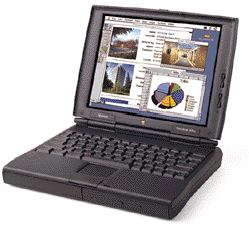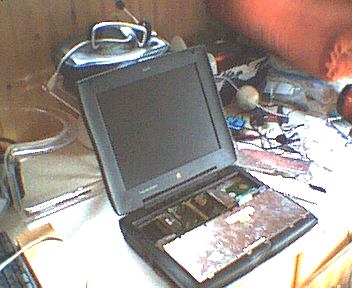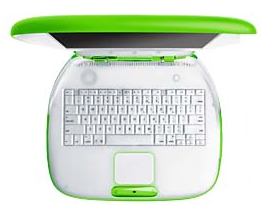Why Can’t Apple Laptops Be Easier To Service And Repair? - Plus PowerBook Mystique Mailbag
by Charles W. Moore
One issue few people consider when purchasing a laptop, or indeed any type of computer, is how easy or otherwise it will be to service and repair.
This is one of my abiding BIG BEEFS, not just with iBooks and PowerBooks, or with Macs, or with computers in general, but indeed with most manufactured products, to wit: very seldom do you find a product designed with ease, simplicity, and economy of maintenance and repair as a priority. Instead, one often derives the impression that the designers and engineers went out of their way to make the thing hard to fix.
How much more pleasant and less tedious life would be if stuff were designed from the get-go for ease of disassembly and repair and/or module replacement. Instead, more often you get products that are a challenge just to get inside and work on, even for trained technicians equipped with appropriate tools and manuals. This causes unnecessary down time and expense for the consumer.

Among PowerBooks, the easiest to open up and work was the 1400, which also included nice touches such as two RAM upgrade slots and easy processor upgrading, in an appealing form factor.

None of these machines were anything close to ideal from an ease of service and repair perspective, but they represented the high water mark in the Apple portable context in that regard, and it’s been pretty much downhill since then. The Titanium PowerBook represented a regression from the Pismo, although access to the hard drive wasn’t too horrible other than the challenge of getting the bottom back on the case properly. The 12-inch and 17-inch aluminum PowerBooks are less easy to work on than the TiBooks, but at least they are more rugged and don’t require service and repair as often. Oddly, the 15-inch AlBook, which is the newest of the three design-wise, is arguably the least easy of the current PowerBooks to work on.
Good resources for checking out the relative difficulty of tearing down and repairing various PowerBooks and iBooks are the free PB FixIt PowerBook Teardown Guide series:
http://www.pbfixit.com/cart/catalog/
As for iBooks, aside from RAM upgrades, they have all been miserable to open up and work on from the beginning. For example, in order to replace the hard drive in my G3 iBook, it would be necessary to strip the machine down to a virtually bare chassis, which is a tedious and challenging job even for professionals. The Mac mini seems to have been deliberately designed to make even RAM upgrades difficult for do it yourself users.
Some might argue that difficult access to the internals is the price we have to pay for razor-thin, feather-light laptops, but the original clamshell iBook was one of the biggest laptops Apple ever made, and it was a nightmare to work on. Just accessing the hard drive bay is a job involving the removal of over two dozen screws, hex nuts, plastic parts, and very small, sensitive, electronic components.

It doesn’t have to be this way. With some PC laptops, you can even swap the hard drive in and out without opening the case at all. It would be nice to think that with the coming Intel-based Apple laptops, that some of this repair and service friendliness might come along with the migration, but it’s not a very lively hope. It’s obvious that ease of service has not been a Jobs-era priority for Apple, although the design of professional Power Macs beginning with the Sawtooth G3 tower have been some of the best from a service and upgrade access perspective of any personal computer ever. A bit of spillover to the laptop department would be nice.
One of the best Mac ideas ever was the slide-out logic board module introduced on the Color Classic in 1993, and continued through the all-in-one 500 and 5000 series desktops, and the LC/Performa/Quadra 630 family. You didn’t even need any tools to drop in a RAM upgrade or a PDS card. You just had to release the catches on the back panel and slide the logic board either part way or completely out. Slick. Not only that, but on my old LC 520, you can also remove the hard drive, floppy drive, and CD-ROM drive with no tools necessary.
Probably that sort of ease of access is too much to hope for in any PowerBook or iBook, but they could still be a lot easier to get into. Ideally, you should be able to open up and disassemble your PowerBook with a standard Phillips screwdriver or common size Torx (those Torx T-8s can be hard to find).
The disassembly screws should be easily accessible, with none of those sneaky hidden jobbies, and case separation straightforward. Once inside, all components should be easily removable, again with standard screws if fasteners are needed and with no bending, prying, or other contortions necessary.
Even better would be a modular motif that would allow you to custom tailor your ‘Book to meet your particular requirements and/or fit your budget, but you wouldn’t be locked into a particular configuration, and could conceivably own the makings of several different configurations to suit different specific tasks. You would also be able to upgrade particular features of your ‘Book without investing in a whole new machine.
My dream PowerBook would be both processor upgradeable, and easy to work on for things like RAM and hard drive upgrades. Another area where there is plenty of room for improvement would be establishing channels to make replacement PowerBook parts easily and conveniently available (the current status quo is that it is difficult for even authorized Apple service providers to obtain PowerBook parts!).
An Apple Service supervisor once remarked to me that computers are just big Lego sets. I like that analogy, but would love to see extended to a degree that Apple laptops really were almost as easy to take apart and put together as Lego creations.
I see no logical reason why any PowerBook, or indeed other types of computers, could not be built to be easy to strip down to their basic component modules. Instead, it often appears that computers are designed deliberately to make them difficult to take apart and service.
I’m not holding my breath waiting for a modular, easy to disassemble, conveniently processor upgradeable PowerBook,though. While I think there would be a ready market for a mix-and-match ‘Book, I doubt that a much higher percentage of laptop buyers give any thought to ease of service issues when choosing a computer than most people do when shopping for an automobile.
Apple’s hostility to third-party processor upgrades is well known. They want to sell you upgrades themselves, with a new computer wrapped around them. I doubt that we will have much realistic hope of there being another PowerBook as easy to work on and upgrade as the 1400 unless significant consumer pressure can be brought to bear, and I don’t anticipate that happening, at least until the computer market matures more than it has up to now.
I once imagined that eventually consumers might get tired of buying computers that go obsolete within two years with no upgrade path, but new computer prices have decreased so much over the past several years, especially at the consumer machine level, that I suppose we could just resign ourselves to regarding them as semi “disposable” commodities. There’s a lot about that concept that rubs me wrong way, but it’s the direction we’re headed, alas.
Ę
PowerBook Mystique Mailbag
iBook vs New iBook
From Terry Jackson
Hi Charles,
I just read your article on Apple’s move towards Intel processors. I am about ready to buy the iBook but now I am unsure if that is a wise purchase given that Apple appears to be getting ready to launch the iBook with the new processor next year. If you could answer my questions, it would be much appreciated.
If I were to buy the current iBook, would the switch to the Intel in 06 cause me any grief in terms of software use etc?
Also, do you have any idea when we may see these new iBooks and what their prices will look like?
Thanks so much for any insight and help you may provide,
Sincerely,
Terry Jackson
Hi Terry;
Whether or not buying a new Mac right now is a sensible strategy or not really depends on one’s individual circumstances. In some respects, moving on onto an Intel-based machine could actually cause more grief, at least in the short-term, than sticking with a PowerPC Mac for a few more years. if you only use a relatively small suite of software, and are happy with the generous bundle of applications Apple ships with the iBook, then the processor switch should be relatively painless. On the other hand, if you use a large variety of software, which will probably have to be replaced, or in some cases may not even be available for the Intel Macs in the early going, there is a strong case for sticking with PowerPC for a while.
Personally, I’m still on the fence, and I could very well endowed with one more Power PC Mac for my next system upgrade.
I am expecting the laptop models they be some of the first machines that Apple converts to Intel, so if they projected road map holds, we could see new iBooks around next June or July. That’s quite a long time to wait, if you need a new machine now, and that’s if my guess is correct about timing. I have no insider information.
Regarding pricing, I anticipate that we won’t see a big deviation from current price points, at least in the early going, although that is more pure guesswork on my part.
I don’t think you have any worries about the latest iBooks being a good value. With the upgrades announced in July, they are a positive bargain, and should serve those who buy them well for several years to come.
Hope this helps a bit.
Charles